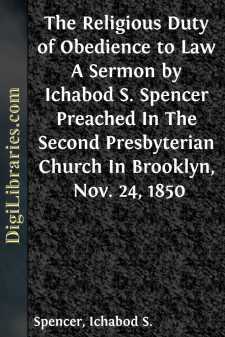Categories
- Antiques & Collectibles 13
- Architecture 36
- Art 48
- Bibles 22
- Biography & Autobiography 813
- Body, Mind & Spirit 142
- Business & Economics 28
- Children's Books 15
- Children's Fiction 12
- Computers 4
- Cooking 94
- Crafts & Hobbies 4
- Drama 346
- Education 46
- Family & Relationships 57
- Fiction 11828
- Games 19
- Gardening 17
- Health & Fitness 34
- History 1377
- House & Home 1
- Humor 147
- Juvenile Fiction 1873
- Juvenile Nonfiction 202
- Language Arts & Disciplines 88
- Law 16
- Literary Collections 686
- Literary Criticism 179
- Mathematics 13
- Medical 41
- Music 40
- Nature 179
- Non-Classifiable 1768
- Performing Arts 7
- Periodicals 1453
- Philosophy 64
- Photography 2
- Poetry 896
- Political Science 203
- Psychology 42
- Reference 154
- Religion 513
- Science 126
- Self-Help 84
- Social Science 81
- Sports & Recreation 34
- Study Aids 3
- Technology & Engineering 59
- Transportation 23
- Travel 463
- True Crime 29
The Religious Duty of Obedience to Law A Sermon by Ichabod S. Spencer Preached In The Second Presbyterian Church In Brooklyn, Nov. 24, 1850
Categories:
Description:
Excerpt
SERMON.
Titus, III. 1. Put them in mind to be subject to principalities and powers to obey magistrates, to be ready for every good work.
Ro. xiii. 1-7. Let every soul be subject unto the higher powers. For there is no power but of God, the powers that be, are ordained of God. Whosoever, therefore, resisteth the power, resisteth the ordinance of God, and they that resist shall receive to themselves damnation: (harm, loss, or ruin). For rulers are not a terror to good works, but to the evil. Wilt thou then not be afraid of the power? do that which is good and thou shalt have praise of the same: for he is the minister of God to thee for good. But if thou do that which is evil, be afraid; for he beareth not the sword in vain: for he is the minister of God, a revenger to execute wrath upon him that doeth evil. Wherefore ye must needs be subject, not only for wrath, but also for conscience' sake. For, for this cause pay ye tribute also, for they are God's ministers, attending continually upon this very thing. Render therefore to all their dues: tribute to whom tribute is due; custom to whom custom; fear to whom fear; honor to whom honor.
There are two great classes of human duty. One of them embraces duties which we owe to God, the other embraces duties which we owe to men.
This classification of duties received the sanction of Jesus Christ, when he spake of loving the Lord our God with all our heart, as the spirit and sum of the one class of duties, and of loving our neighbor as ourselves, as the spirit and sum of the other class of duties. It had also been previously taught at Mount Sinai, when God gave to Moses the two tables of the law—the one enjoining our duty to God, the other enjoining our duty to man.
This classification of duties is not arbitrary. It is founded on truth and nature. Men have relations to God, as their Creator, Upholder, Governor, Redeemer, and rightful Judge; and they are bound to recognize these relations, and feel and act accordingly. Men hold relations to one another, as parents, children, citizens, rulers, and subjects; and they are bound to recognize these relations, and feel and act accordingly. Such is the will of God. Such is the law of God. There can be no holiness in man aside from conformity to the will of God in this thing.
This principle is carried out in all the teachings of the New Testament, with an emphasis and a plainness which no candid and unprejudiced mind can fail to understand. Jesus Christ has incorporated it into his sermon on the mount in many particulars, wherein he insists upon our social duties, while he teaches religion. He preached this principle when he said, "render unto Caesar the things that are Caesar's, and unto God the things that are God's." He practised on this principle when he made the fish bring in his mouth the tribute-money which, as a citizen, he owed to the government of the country,—a government a thousandfold more oppressive than ours.
It would be a fundamental error, if we were to maintain, that religion has nothing to do with the regulation of our conduct towards one another,—as parents, as children, as magistrates, subjects and citizens; but that it has left all that field of duty to be regulated by the individual preferences of men....


